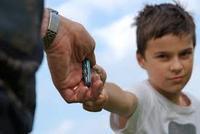
An earlier version of this article appeared on the Times of Israel.
When parents ask me directly at what age they should get their children a cell phone, I generally do not answer. Despite the specificity of the question and regardless of what I say, parents make their own decisions, and these decisions usually fall into reasonably well-defined categories. Overprotective parents justify purchasing cell phones for their children while they are still preadolescent, somewhere around 11 or 12 years old. Their argument goes something like this: “If they get into trouble and need me, they have a way to contact me immediately.” Yet why a mature adult is not supervising children at that young age does not factor into their equation.
Parents who aspire to being up to date with the latest of everything give their children cell phones at an even younger age. They are the trendsetters. Other children who want the same things are jealous of them and use them as an example when petitioning their own parents.
Other parents wait until their children are in the teen years before they broach the idea of a cell phone for children. Some in this age group even tell their children that if they want their own phones, they have to help cover the cost of owning the phone and service fees.
There is, of course, a fourth group of parents who absolutely refuse to get their children cell phones. Somehow, these children manage to get phones for themselves, sometimes without the knowledge of the parents.
There is another reason I do not offer a broad opinion on children and cell phones: Regardless of the age of the child who gets a phone, use of that phone is often based on the model for use that the parents set. If a parent is always on their cell, the child is likely to do the same. If the parent is checking messages, emails, or playing Candy Crush or Solitaire, their child will inevitably be doing the same. The games may be different, but the draw to play a video game on a cell phone is very much the same. Children do learn a great deal from their parents, even their compulsions.
Opportunities for special bonding between parents and their children are limitless. Just taking a break from the stress of the typical school and workday and spending a few minutes together, doing homework, studying, playing a game or just lounging together, are just some instances that everyone in the family looks forward to. Sometimes these moments are spontaneous, and sometimes months of planning go into the choices of family activities. Sometimes children ask for special activities. Either way, they are pleasurable events that are amusing and can be a real revelation to watch if you are a psychologist, sociologist, anthropologist or simply like to observe people. If you watch this in a public setting, you can see imprinting at work as children line up to follow their parents or older siblings. You can watch how bonding happens. You can see how children who are overwhelmed learn to confront and overcome fear. You can also observe a rainbow of personalities in the making. Most of all, you can become witness to some detrimental behaviors, behaviors like cell phone use.
When I say “detrimental” in this context, I am not speaking of children and their cell phones; I am referring to parents and their cells.
The new Cinderella movie is playing. The theater is packed with parents, a few grandparents, and a few hundred children. Before the movie is shown, a brief trailer tells people in the theater to put away their phones because they are disturbing to others, even if you are just texting. Perhaps the thirty or so parents did not hear the public announcement or did not look up to watch it, because the little lights from an active cell are actively disturbing. More disturbing is hearing little Shana or Tommy say: “Mommy, Mommy, Mommy… Why is Cinderella crying?” and Mommy is too busy on her cell to even hear their child asking a question. It is not just mothers–fathers are also guilty. One fellow does not put his cell down throughout the entire two hours or so.
Don’t worry, the parents were consistent–they continued to use their phones as they exited the theatre and as they drove off. They also had the phones on and active at the park and in the yogurt store. True, not all parents are so compulsive with their cells, but unfortunately, too many are. I wonder if it is time to expand the legal definition of child abuse and neglect to include parents who apparently care more for their cell phones than their children.
Michael J. Salamon, Ph.D., FICPP, is the Senior Psychologist/Director of ADC Psychological Services in Hewlett, New York. Visit his website, www.psychologicalhelp.org
 Previous
Previous

